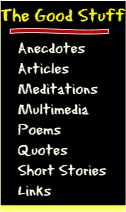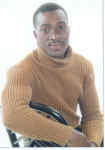|




Dan Akinlolu
Reviews
"gbemi writes like a sage, typical of african
griots. he knows how to forge his
words, carve the words and make them jump at the readers face. good work
gbemi! more of such short story."
aby forever
India
"gbemi did
justice to the spiritual atmosphere of african politics and yearnings for freedom."
katherine cole
Canada
"i am impressed. such a rare
talent. i wish there are more africans on bright light multimedia cafe,
but gbemi truly represent africa."
segun akinlolu
Canada
"Short,
precise and descriptive. nice show case."
Bob
Leon United States
"it
was really creative very interesting and full of life. i look forward to
more of such on your site."
adepoju
taiwo Nigeria
"it's
a very good creative, inspiring, talented work. To whom more is given
much is expected!"
tope
okunlola Nigeria
"anaestesia is an interesting piece with such suspence that is thrilling. good work bright light multimedia you are doing great for writers and artistes."
oyin adekunle
United Kingdom
"anaestesia is really very haunting. i mean one of such work that writer like gbemi wouldnt waste words
on. each word is pregnant in meaning and such is a rare talent."
nike ogunfowora
South Africa
"You are indeed a rare gem, and again may i say that you should keep on going, because to
me, Heaven is the limit, not sky again."
Oyindamola
Adekunle United Kingdom
"To you Gbemi, your literary intellectual possession show the difference in your writings and
compositions. You are a blessing to this new generation that promote literary arts especially
literature, may you in your capacity continue your promotion and intellectual creativity."
Mayowa Adeniran
Nigeria


Achievement
Buy this Poster at AllPosters.com
|

It's
easy to
look into the future and
make the right
decisions,
by accessing your own
Higher Consciousness.
More Information ... |

Dan
Akinlolu
|
|
The
Bright Light Café Presents ...

Interview
with Dan Akinlolu
Biography
Photos
Articles
Short
Stories

When
were you born?
I was born on 1st
of March 1978. Thank
God it wasn’t 28th of February; perhaps I would
have been a Leap Year baby.
Where were you born and raised?
I was born in Ibadan,
Nigeria. I actually grew up in a large African family where we
value communal relationship. I have one “Mum” but many
“Mothers” what I mean is that because I grew up in a large
family, lessons about life and what I wish to be in life came
to me from multiple point of view and I think that really gave
me an edge not to see life from one angle. If I did what was
wrong, my mum wasn’t the only one to correct me, several
other mothers and brothers and sisters are available to put me
through. My father on the other hand was practically a very
strict man, and I could say I had a very early exposure to
reading.
How has your up
bringing influence your writing?
Like I said, I grew
up in an environment where we value books. My father reads a
lot, he reads all through the night like he’s got an
examination the following day, he treated his books and
Christian literatures as if they were human beings, and he had
to put that habit into everyone of us. Somehow, I realized it
was some sort of a genetic trait as well. However, I started
developing interest by reading the books of Solomon especially
the Proverbs and Ecclesiastics, then the book of Job in the
bible. They were wonderful poetic stories that have universal
themes and common explanation to everyday problems. Besides,
most African writers find it easier to lay claim to oral
tradition as their source of inspiration, in the form of
fables, folktales or panegyric poetry. No doubt about that
because Africa is apparently rich in such tradition, but it is
more than that for me. Though
I enjoy tapping into African proverbs for contemporary
consumptions yet I enjoyed calling myself a third world writer
than an African writer. I feel better as a third world writer.
When did you first
start writing and why? What prompted you to become a writer?
Honestly that is a
very big question. It is like asking why a mother gave birth
to baby boy or a baby girl. Writing didn’t just happened to
me one day, I could say I practically grew up with it. For
instance most of my brothers write poetry flawlessly, infact
one of my elder brother is a highly rated African poet and
artiste in Canada. But I published my first poetry with one
reputable poetry organization in USA in the 90s when I was
barely 20 years old but the truth was that I wasn’t a good
poet, I was just fortunate to get the poetry “Elegun the
Masquerade” nominated and published because the organization
needed a new voice and experiment from Africa, so the poetry
was relevant to them. Several times I’ve tried poetry but it
always turned as short story. About what prompted me into
writing, I do love seeing my name in prints, there is
something magical about it. Besides that, I love movies. It
influences my juvenile writings a lot and so much that it
pushes me beyond my boundary to explore things bigger than
what I was. I enjoyed making friends with older people and I
could remember an old friend, a lawyer, who advised me to
write like an African and not about James Bond or Spider man.
What is your favourite
book?
My favourite book is
not one book. I have challenged myself to read as many titles
and authors as possible. Any book that challenges my
creativity and pushes my intellectual capacity to a certain
thought pattern could be my favourite book. For instance, I
studied English in the University of Ibadan, which alone
exposed me to lots of literary traditions. In addition to that
my first job was a sales executive in one of the largest
bookselling firm, where I was faced with the challenges of
reading as many books as possible so as to recommend good
books to customers because you don’t sell what you don’t
know. Besides, I had the opportunity of flirting around the
publishing industry as an external editor to assess and
evaluate manuscripts for possible publication. Though I was
young and a bit inexperienced, yet I was quick enough to learn
and could discern that there was a big difference between
writing a book and writing a story and of course, that every
writer needed a “signature tune”. Nevertheless, I still
would say some books stick more to my memory than others,
which include Frank McCourt’s “Angela’s Ashes” and Ben
Okri’s “The famished Road”, Samuel Selvon’s “Lonely
Londoners” and several other literary appreciation and
biographies. The why? is because they are simple books that
capture my world view, though I do not enjoy writings in
sequel because authors tend to over use the setting and the
monotony of characters is no longer original and genuine,
nevertheless some works strikes me with the first paragraphs
and sometimes by the first statement.
What is your favourite
poetry?
Poetry? Hmmmmm,
it’s difficult too. I enjoy John Milton’s “Paradise
Lost” because its got a very wonderful opening that got me
hooked up. But generally, Epic poetry fascinates me, they
share a certain feature with short stories; they are bit
prosaic in terms of length though the language could be
archaic and grand. But I have read a handful of epic poetry
that I’ve even adapted one of them for screenplay.
What is your favourite
short story?
No
favourite short story. But I loved Barbara Llewellyn's opening
in “Words” and Malcolm
Carvalho’s “The Maestro” but
in addition to that, I enjoy any short stories that come from
any third world countries especially from Caribbean and Latin
America, they have a way of domesticating the English language
to make it humorous, and humour plays a very major role in my
personal opinion of everyday life.
Who
is your favourite writer?
Any writer that could weave
humour round a serious situation to make it look simple as
part of life has a technique of affecting my mind to an
extent. Samuel Selvon is good at that, and the Irish author,
Frank McCourt, display a huge amount of such skills, Gabriel
Garcia Marquez is also very good. The truth is that, it is not
an easy task to make people laugh talk less of making them
laugh loud while reading. It takes a lot of mastery and to
understudy those who are good at it.
What is your Favourite
song?
Classical piece,
Jazz and African music. They make me reflective and
meditative.
What are your Writing
goals?
May be Commonwealth
Prize for Literature... may be Caine African writers’
Award...Pulitzer Prize ... may be Nobel laureate in
literature…. may be Booker Prize. There are lots and lots of
may be’s; what is important for me is to write first; season
and people will decide whether I will be a classic and a
bestseller.
What are your dream
and goals?
I must confess
that I am already living my dreams and goals; all I need is to
work more hard to make things happen and invest in good
positive friends like Rod Kirkham and Barbara Llewellyn, they
are part of my story because they sort of believe in me. Some
big things in life happens when you push, some happens when
you are patient, others happen when you push at the same time
be patient for the result.
What are your Hobbies?
My hobby is
actually my career. I try to enjoy whatever I do.
What is the writing
process like for you? Do
you sweat blood or do the words come easily?
Every writer will
tell you sometimes it flows and at other times, you’re kinda
stuck!
However, I think I enjoyed a privilege of “spoken-writing”
stories. First, don’t forget that English language isn’t
my mother tongue, I speak Yoruba, but the fact that I love to
write as if I am talking makes me see the beauty in all
languages though it is very technical. All languages are
beautiful if you make people read as if they are talking,
stories become alive, participatory and easier to identify
with. People don’t read because writers are boring, writers
are boring because they don’t read, and they don’t read
other people’s work because they only write to win
competitions and not because they are writer.
For my part, I am still growing, I still need to invest more
in myself and improve on my skills in the bid to maintain
quality stories but so far, I have, in a way, contributed to
literary development across the boundary which is somehow
unusual for someone of my age.
Do you have an advice
for aspiring writers?
Read other people’s
work; write what you would love to read. Most importantly,
have the confidence to call yourself a writer even if you are
lazy about it. The more you do so the more you put yourself
under an obligation to write something as a proof. After all
professional writers are amateurs who didn’t quit.

|
|